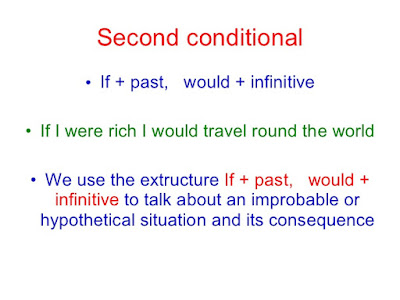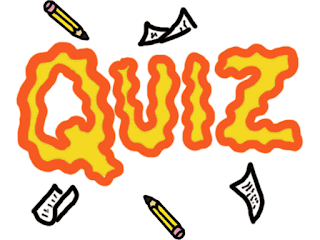CONDITIONALS
CONDITIONALS
Conditional
tenses are used to speculate about what could happen, what might have happened,
and what we wish would happen. In English, most sentences using the conditional
contain the word if.
Many conditional forms in English are used in sentences that include verbs in
one of the past tenses. This usage is referred to as "the unreal past" because we use a past tense but we are not actually referring to
something that happened in the past. There are five main ways of constructing
conditional sentences in English. In all cases, these sentences are made up of
an if clause
and a main clause. In many negative conditional sentences, there is an
equivalent sentence construction using "unless" instead of "if".
Use table
| Conditional sentence type | Usage | If clause verb tense | Main clause verb tense |
|---|---|---|---|
| Zero | General truths | Simple present | Simple present |
| Type 1 | A possible condition and its probable result | Simple present | Simple future |
| Type 2 | A hypothetical condition and its probable result | Simple past | Present conditional or Present continuous conditional |
| Type 3 | An unreal past condition and its probable result in the past | Past perfect | Perfect conditional |
| Mixed type | An unreal past condition and its probable result in the present | Past perfect | Present contditional |
ARE CLASSIFIED IN
zero conditional
The order of the two sentences that make up the structure of the conditional can be changed. If we start with the condition (If), we will separate them with a comma. If we start with the phrase that expresses the result, it is not necessary to put the comma.
First conditional
In English there are several types of conditional, among them, the first conditional. This type of conditional is used in situations in which if a condition is met, a given result is likely to occur.second conditional
We use a past verb though are imagining the present or the future to be different.
The second clause of subject + would + verb (conditional verb) is conditional to the first clause happening (or will only happen if the first part/clause happens).
Example: If I won the lottery, I would travel around the world.
It is unlikely that I will win the lottery, but I'm going to hypothetically imagine that I did win. In that situation I would travel around the world. So in order for me to travel around the world, I would need the first clause (the condition or situation) to happen, that is, for me to win the lottery first.
https://www.slideshare.net/maypulido/second-conditional-7775307
Third conditional
The first conditional and second conditionals talk about the future. With the third conditional we talk about the past. We talk about a condition in the past that did not happen. That is why there is no possibility for this condition. The third conditional is also like a dream, but with no possibility of the dream coming true.








Comentarios
Publicar un comentario